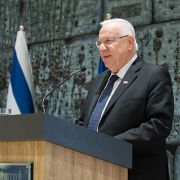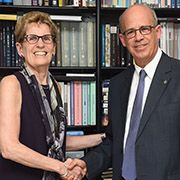BOG 2016: Dan David Prizes Awarded
From left: Ariel David, member of the Dan David Prize and Dan David Foundation; Prof. Itamar Rabinovich, Chairman of the Dan David Foundation, TAU President Joseph Klafter, TAU Honorary Fellow Gabriela David; Prof. Paul Alvisatos; Prof. François Bourgignon; Prof. James Heckman; Mrs. Atkinson; Prof. Chad A. Mirkin; and Prof. Sir John Pendry
The 15th annual Dan David Prize Award Ceremony was held in TAU’s Miriam and Adolfo Smolarz Auditorium to a packed audience of dignitaries, academics, governors and friends. The Prize, which is endowed by the Dan David Foundation and administered by Tel Aviv University, is one of the biggest and most prestigious in the global academic arena. It recognizes individuals who have had an outstanding scientific, cultural or social impact on our world.
TAU President Joseph Klafter said that the Prize “was the personal creation of the late Dan David. Fortunately, Dan’s passion for knowledge and discovery lives on through the Prize and it is in his name that we gather here for the 15th time tonight.”
Prof. Klafter announced a new project at TAU supported by the Dan David Foundation – the Dan David Center for Human Evolution and Biohistory Research. The Center will be located at the Steinhardt Museum of Natural History, Israel National Center for Biodiversity Studies, which is scheduled to open in early 2017. Prof. Klafter noted that the Dan David Center will house 15,000 specimens that make up TAU’s Biological Anthropology Collection, which provides a record of 1.5 million years of evolution in our region, and will reveal secrets about the lives of our early ancestors that have implications for us today.
TAU Governor Ariel David, son of the late Dan David and a board member of the Dan David Prize and Dan David Foundation, told the audience, “In choosing to establish and headquarter this prize at Tel Aviv University, my father sought to create a connection between the faculty and students of this university and the laureates. He believed that such a connection would not only benefit the University, but also Israel as a whole. He wished to show that Israel is not only a center of conflict and tension, but also a center for cultural and scientific advancement that conducts dialogue and interaction with the rest of the world.”
Mr. David announced that the $300,000 prize money that was not collected by historian Prof. Catherine Hall, “who apparently rejected the prize due to political reasons,” would be donated to researchers and students at TAU. “This will give these scholars – Jewish, Arab, Druze and international students, the opportunity to engage in academic dialogue on this beautiful campus. Such an action can contribute more to understanding and dialogue than any misguided effort to boycott the bastion of democracy and intellectual freedom that is Tel Aviv University,” he continued.
Each year, three $1 million prizes are awarded in three time dimensions – past, present and future – and shared equally among the recipients in each dimension. The prize for the Past Dimension, “Social History – New Directions,” was awarded to: Prof. Inga Clendinnen for her work on the history of cultural encounters in the early modern period; and Prof. Ariette Farge from the Center for Historical Research, Paris, whose work in women’s history, urban history and the history of crime and its policing and control has significantly deepened understanding of social history.
The prize in the Present Dimension, “Combating Poverty,” was shared by three scholars: Prof. Sir Anthony B. Atkinson of the London School of Economics and Nuffield College, Oxford, for his work on poverty and inequality, social justice and public policy; Prof. Francois Bourgignon of the Paris School of Economics and a former Chief Economist of the World Bank, for his work on poverty and inequality from a global perspective; and Prof. James J. Heckman of the University of Chicago, for his work promoting early childhood education, nurture and wellbeing.
In the Future Dimension, “Nanoscience,” the laureates were: Prof. Paul Alivisatos of the University of California, Berkeley, a founding father of the field of nanoscience whose pioneering development of the fundamental building blocks of nanotechnology – nanocrystals, nanowires and complex nano-objects – has led to novel biomedical diagnosis tools and a new generation of hybrid solar cells; Prof. Chad A. Mirkin of Northwestern University, USA, for his work on nanomaterials that has led to the development of analytical tools in chemical and biological sensing, lithography and optics; and Prof. Sir John Pendry of Imperial College, London, a condensed matter theorist who has brought about the most significant advances in electromagnetism through his concepts and designs of a new class of materials for the manufacture of lenses that beat the diffraction limit and cloaks that render objects invisible.






